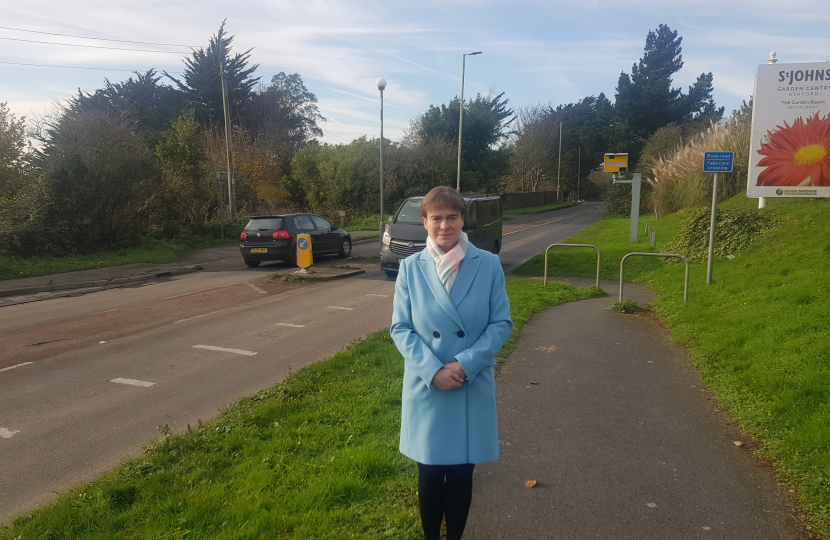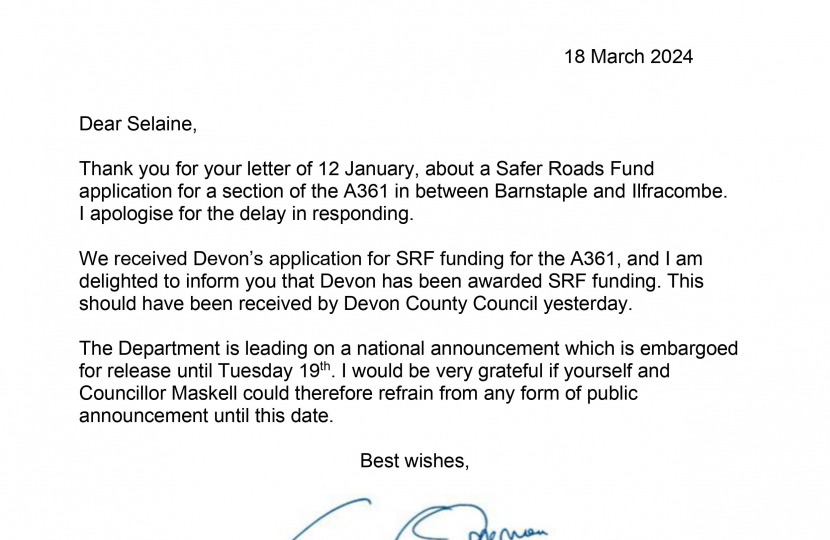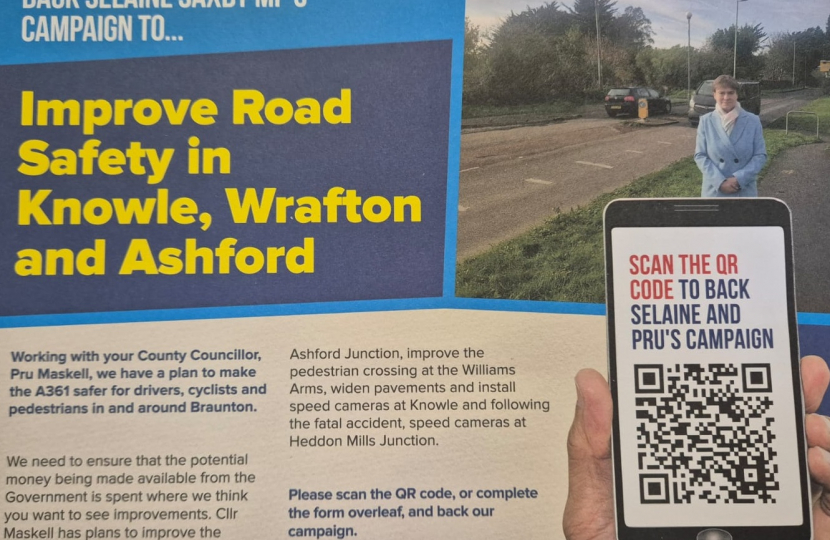Just over £5 million has been allocated for safety upgrades to the A361 between Barnstaple and Ilfracombe.
Drivers across England will benefit from a further £38.3 million of Department for Transport investment, improving safety on 17 of the most high risk roads in England. These upgrades from the Safer Roads Fund (SRF) will substantially improved the star rating of the lowest rated sections of the A361, particularly on the outskirts of Braunton. The proposed scheme is forecast to prevent over 20 fatal and serious injuries in the coming 20 years.
This funding comes on top of the £147.5 million already invested to deliver lifesaving improvements on 82 high risk roads across England. Over a 20 year period, this investment will see significant reductions in fatal and serious injuries, up to as much as a 30.8% reduction on some roads.
According to the Road Safety Foundation (RSF), it is estimated that all tranches of the Safer Road Fund will save nearly 2,600 fatal and serious injuries over the next 20 years.
Once the whole life costs are factored in for the schemes, the overall benefit cost ratio of the investment is estimated at 5:3, meaning for every £1 invested, the societal benefit would be £5.30.
Selaine Saxby, MP for North Devon said:
“Over a year ago, I began campaigning to make the A361 safer for drivers, cyclists and pedestrians in and around Braunton and Ashford. Having located the appropriate Department for Transport scheme, I worked alongside Cllr Pru Maskell and Cllr Andrea Davis to lobby Devon Highways to ensure a bid was submitted following a tragic, fatal accident at the Heddon Mills Junction. Whilst we all welcome this significant funding it unfortunately comes in the wake of a further serious accident near Ashford over the weekend.
“I have been in regular contact with the Department for Transport over the ongoing issues on our North Devon road network with the delays on the Link Road, Cedars Roundabout and ongoing pothole problems. To clarify, the maintenance and repair of our roads and potholes resides with Devon County Council as no roads in North Devon fall under National Highways. The Department for Transport have required local authorities to detail their plans to reduce the pothole proliferation we have seen in recent years and I will continue to work with the Department to ensure our local Highways Department delivers good value for government money, which is ultimately taxpayer’s money.
“The Government have given Devon County Council an additional £6.7m this year, £6.7m next year, and a total of £208.6m by 2033/34 to improve our roads. When I was first elected in 2019, this longer term, planned and sustainable funding was exactly what the Head of Devon Highways asked for and they now have it.
“I want to reassure you that I continuously raise residents’ and my own concerns regarding the length of time it is taking to complete the A361, as well as the process and time it takes to repair potholes, and I continue to collect residents’ views on the entirely unacceptable situation imposed on us at Cedars Roundabout. Indeed, I have more responses than the original consultation into the project, which I believe should be heard and it is important our County Council learn from the current multiple issues on our road network.
“Thank you to everyone who has fed back their views – and thank you to the road teams who are repairing potholes, working at Cedars and on the A361, I hope everyone recognises the failures of our roads are of management not the hardworking teams out on the road network.”
Transport Secretary, Mark Harper, said:
“Britain’s roads are some of the safest in the world, but we are always looking at ways to help keep drivers and all road users safe.
“As part of the government’s plan to improve roads across the country, we’re providing an extra £38 million so that local councils in England have the support they need to keep everyone safe while reducing congestion and helping to grow the economy.”
Dr Suzy Charman, Executive Director of RSF, said:
“The Safer Roads Fund is a transformational initiative for road safety and for the local authorities receiving funds. It makes it possible for road safety teams across the country to proactively address risk of death and serious injury for all road users on these routes.
“Systematic changes have already had a big impact on road death and serious injury, for example, seat belts and airbags protect lives when crashes happen. In the same way, we can design roads so that when crashes happen people can walk away – by clearing or protecting roadsides, putting in cross hatching to add space between vehicles, providing safer junctions like roundabouts or adding signalisation and/or turning pockets, and including facilities for walking and cycling.
“We congratulate the Department for Transport on this lifesaving initiative and thank ministers for their commitment to safer roads.”




